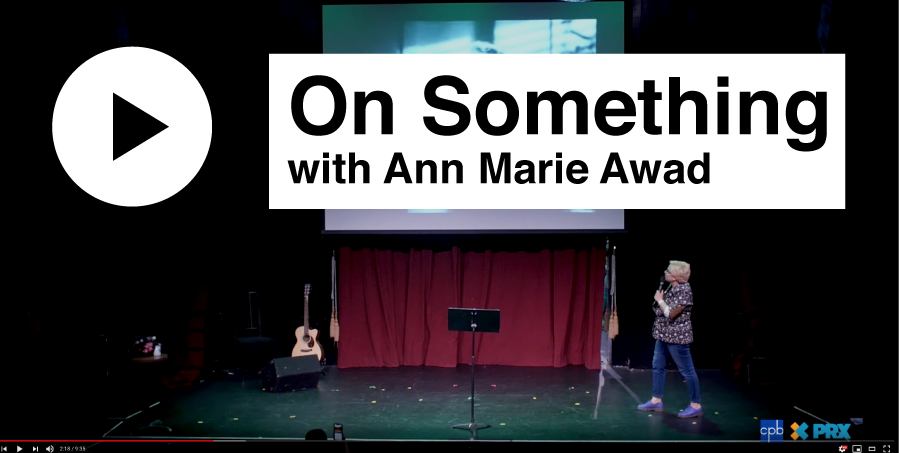Weed, reefer, jive, mary jane, pot, cannabis. The many names of marijuana. A new podcast by CPR and PRX unmasks the many faces of marijuana after legalization. Colorado was the first state to legalize recreational marijuana on November 6, 2012. Now, marijuana is legal in some form in 33 states and D.C.. Whether you are an advocate of compassionate use, a recreational user, or an opponent, the movement from illegalization to legalization impacts people in surprising ways. Learn how marijuana benefits to the terminally ill led to a watershed moment in the journey toward legalization and how the War on Drugs has led to a significant increase in incarceration rates among minority populations.
![]()
Don’t miss an episode! Subscribe to On Something.
On Something is a podcast from Colorado Public Radio (CPR) and PRX that explores the “personal stories behind the political, legal, and cultural effects of legalization.” Journalist Ann Marie Awad shares the curious underpinnings of how it became illegal and the curiouser effects of legalization on real people.
Why Care About Cannabis?
Even if you don’t use marijuana, you are probably curious about how marijuana legalization will affect Colorado, the nation, and the people around you. Here are a few questions that On Something will be uniquely poised to address through personal story:
- What happens to people who were convicted of marijuana-related crimes prior to legalization? Are their records expunged? (HB19-1275 was signed into act in 2019 concerning increased eligibility for the sealing of criminal justice records.)
- How much money have states with legalized use collected in taxes? Where does the money go?
- How did the focus on compassionate use impact the legalization journey?
- Was race a factor in making marijuana illegal or legal?
- How has legalization impacted incarceration rates?
- How has legalization impacted illegal underage use?
- Has life changed for people after marijuana legalization across the United States?
- How will legalization and marijuana commercialization affect small businesses?
- How do legal discrepancies between states and the federal government impact people?
Cannabis: Shifting Perception
In the late 1800s, cannabis was available, legal, and unregulated. Actually, alcohol, heroin, cocaine, and cannabis were often part of a home medicine cabinet for common ailments. The first episode of the podcast features interviews with drug historian Adam Rathge and author Emily Dufton and audio from propaganda films, as Awad paints the political landscape of marijuana illegalization and its reform.
Ever wonder why the Spanish word marijuana was used over the scientific term cannabis? Find out on On Something.
The first podcast unearths how the federal government’s anti-marijuana communications focused on its use among black and brown people, revolutionaries, immigrants, and anti-war activists. Here are a few featured historical faces that shaped marijuana history:
Harry Anslinger
In the 1930s, as head of the newly formed Federal Bureau of Narcotics (FBN), Harry Anslinger politically reinvented himself with an anti-marijuana position so he wasn’t obsolete after prohibition ended. He promoted that marijuana made people violent and established racial profiling of its use. Fifty years later, the stereotypes associated with marijuana use prevailed.
President Nixon
Even though the Shafer Commission found that marijuana was not a threat to national security, President Nixon placed marijuana in the same category as heroin and LSD in the Controlled Substances Act of 1970, thus beginning the War on Drugs and a significant increase in incarceration rates of minority populations. According to the , “African Americans and whites use drugs at similar rates, but the imprisonment rate of African Americans for drug charges is almost 6 times that of whites.”
“We knew we couldn’t make it illegal to be either against the war or black, but by getting the public to associate the hippies with marijuana and blacks with heroin, and then criminalizing both heavily, we could disrupt those communities. We could arrest their leaders, raid their homes, break up their meetings, and vilify them night after night on the evening news. Did we know we were lying about the drugs? Of course we did.” – John Ehrlichman
Brownie Mary
HIV/AIDS advocate Brownie Mary helped establish the Compassionate Care Act in California in 1996. This was a watershed moment in the legalization process that continues to be the face of the legalization movement. Marijuana use aids terminally ill cancer patients and people diagnosed with intractable seizures, among others.
Check out this video of Ann Marie Awad as she asks, “who is legalization really for”?

The first episode of the podcast makes clear that 1) your perception of marijuana is likely influenced by who you were told uses it, and 2) legalization is connected to issues that real people face, including issues around money, family, social justice, racism, classism, capitalism, and more. As Awad posits, the most interesting aspect of legalization is its complex impact on everyday people.
The Burgeoning Business of Marijuana Support
Aside from sharing the history of marijana legality and personal stories after legalization, the podcast features non-profit organizations, businesses, and public programs that are popping up in states with legalized marijuana use. For example, in Colorado, the Minority Cannabis Business Association supports diversity inclusion in the marijuana industry and Turning Over a New Leaf helps vacate marijuana criminal convictions that occurred before legalization. Communities are investing in how the legalization process unfolds.
To Everything, There is a Season
In the first episode, drug historian Rathge reminds listeners that public opinion about weed moves in cycles, from fear to acceptance and back again. Whether this podcast inspires you to plant cannabis in your yard, now your hard earned right, or to track the economic impacts on your state (weed money!), you will undoubtedly be intrigued and informed by this blazing podcast.
About Ann Marie Awad
Ann Marie Awad reports and writes the podcast On Something. She joined Colorado Public Radio in 2017 after serving as Education Reporter for KUNC in Greeley, CO. Follow Ann Marie on Twitter here.


















